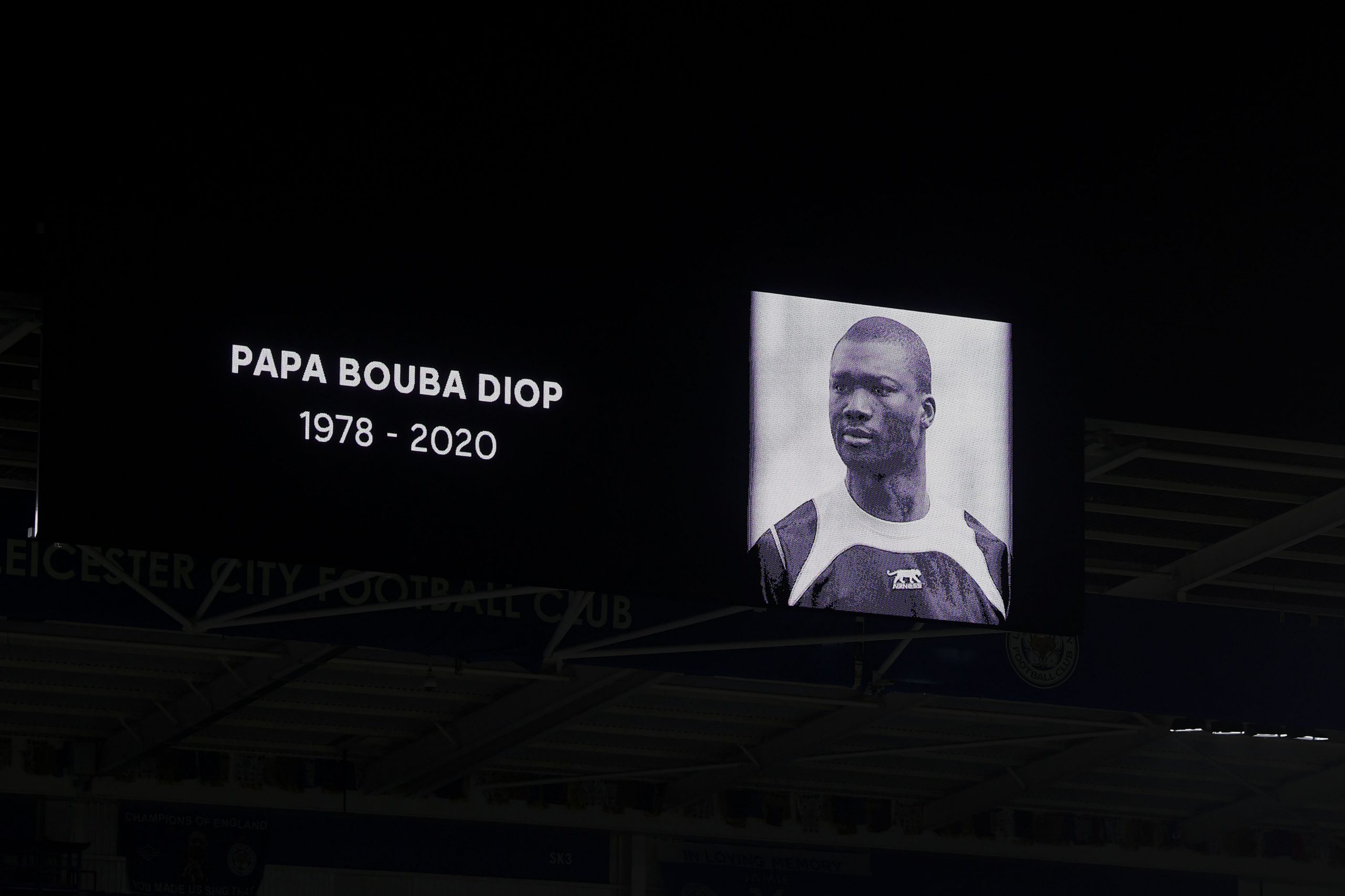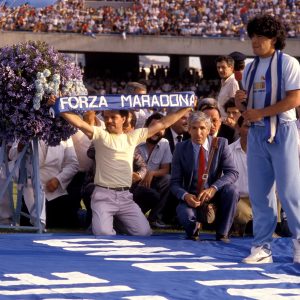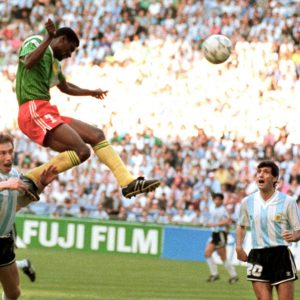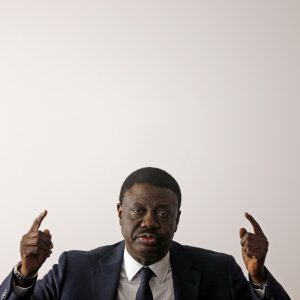Papa Diop, Senegal’s reluctant hero
The towering midfielder who stunned France in the 2002 Fifa World Cup has been described as a gentle giant who put the West African nation on the map with his exploits for the Lions of Teranga.
Author:
7 December 2020

The news of Papa Bouba Diop’s death at the age of 42 came as a further blow to a footballing community still reeling from the death of Diego Maradona.
There are few parallels that can be drawn between the two footballers. Maradona was an extroverted virtuoso, routinely manifesting the implausible and transmitting an electric energy to whatever space he entered. Diop was the opposite: understated, self-effacing to a fault and an unqualified pleasure to be around.
However, there is a tenuous link between them in that both – in very different ways – experienced an iconic African upset in the opening game of a Fifa World Cup. While the Argentine maestro could only watch on as Francois Omam-Biyik rose to head past Nery Pumpido in Cameroon’s victory in 1990, Diop was front and centre for Senegal, pouncing to score and vanquish reigning world and European champions France 12 years later.
Related article:
It is a goal that has come to define the career of the man who would come to be known affectionately as “The Wardrobe”, in reference to his substantial 6-foot, 5-inch frame. Despite campaigning in the Premier League, winning the FA Cup with Portsmouth and scoring eye-catching stunners against giants Chelsea and Manchester United, it is to that moment in Seoul that Diop is inextricably linked.
It is easy enough to understand why. For one thing, there is the sheer scale of the World Cup and the sway it holds over billions around the world. “To score in a World Cup does not happen to everyone,” Diop told me in summer 2014 at Europe’s busiest railway station, Gare du Nord, in the French capital city. “But it happened to me. That special moment will stay with me until I breathe my last breath. The moment I scored, my thoughts went back to the millions of Senegalese back home and how that made them feel.”
A goal against the coloniser
What made that moment sweeter was that it came against France, which colonised Senegal for close to 300 years. Much of the Senegalese identity was – and still is – tied to France, so much so that when Les Bleus won the World Cup in 1998, there was widespread celebration on the streets of Dakar. In the build-up to the 2002 World Cup, pundits took to calling Senegal the “France B” team, basically consisting of players who were not good enough for the reigning world champions. This was also a tacit admission: very few knew what the Teranga Lions were about.
To then produce a shock like that was unprecedented. “No one expected that,” Diop said. “Some of the players in the French team were like idols. You go into matches like that with the aim of collecting the shirt of Zinedine Zidane, Thierry Henry or Patrick Vieira.”
In that sense, the 1-0 victory, secured by Diop’s scuttling finish past Fabien Barthez and a stunned French defence, was a moment of real emancipation. It also announced that Senegal team to the world, and laid the foundation for a strong run. Led by Frenchman Bruno Metsu, who excelled as a motivator and understood how to extract the maximum from every individual, the debutants held off challenges from Denmark, Uruguay and Sweden to claim a World Cup quarterfinal place for Africa for only the second time in history. Ultimately, it took an extra-time golden goal by Turkish forward Ilhan Mansiz to eliminate the West African side.

“Bruno Metsu made us dream and believe,” Diop had said. “We never thought we could lose to any team at that World Cup. It was not arrogance, disrespect or lack of awareness, but it was self-belief. Lions don’t go into a fight thinking they will lose, they do not need to brag about the lion power, you show it. We did that and I will never forget that.”
Despite scoring three goals in that run to the last eight, the towering midfielder never sought to play up his own relevance. “It was not Bouba Diop who scored against France, it was Senegal. Having played for Lens and living close to the city in France, people always stop me to ask about that goal and victory. I say the same thing – that the best team won and it was Senegal.”
Related article:
It is a profound portrait of the humility that defined him, both as a player and as a man. He always politely batted away the suggestion that he is a “hero” in Senegal, and despite being revered at home, he lived quietly away from the spotlight following his retirement. When asked to elaborate on his activities post-football, he described them as “not important”, but did reveal that he was relishing more time with his family. “Once I hung up my boots, I dedicated my life to spending time with my family and sharing my knowledge with young kids who want a career out of the beautiful game. Football gave me so much, and I just wanted to help as much as I could.”
‘Heart of gold’
This is a sentiment those who played with him and knew him well no doubt recognise. According to former Democratic Republic of the Congo defender Gabriel Zakuani, who played alongside the midfielder at Fulham, it was this magnanimity that made Diop special. “Despite being such a giant, he had a heart of gold. He would always have positive energy about him and his smile was infectious,” said Zakuani.
“I can’t think of anyone who would have a bad word to say about him. He was someone that livened up our changing room. The last time I spoke to him was about six weeks ago. We briefly spoke for about five minutes after I heard [about his illness] and he seemed in good spirits. I never knew the extent of his condition, so it came as a complete shock to me.”
Nigeria legend and two-time African Footballer of the Year Nwankwo Kanu also shared a dressing room with The Wardrobe during his time at Portsmouth. “He was such an important player and happy person. Always positive about football and life,” he recalled.
“It was great to play alongside him and we all enjoyed the ‘African Union’ gathering at Portsmouth as brothers from the same continent. A great loss for African football because he made his mark in a positive way.”
Related article:
That African Union featured Diop, Kanu, Sulley Muntari, John Utaka and Benjani Mwaruwari, a strong core that drove Pompey, through a quartet of one-goal victories, to a historic FA Cup victory in 2008 under manager Harry Redknapp. A significant factor in that solidity was, of course, the imposing presence of Diop in the middle of the park.
“He was instrumental to our success that season,” Redknapp said. “He had everything physically and technically, and was always very healthy. This news [of his death] has come as a shock. His size made it almost impossible to play against him on the pitch. But off it, he was always a pleasure to be around, always cheerful. The fans raved about him.”
Crazy incident
Diop might have looked aggressive on the pitch, but he stayed calm when he was the target of racism during a short spell in Greece with AEK Athens between 2010 and 2011.
“I liked things over there in the country, but that incident really made me crazy. But it’s life. You know some will hate you for being who you are and blessed. As a man, you don’t let it define you.”
Diop revealed that his parents were worried he would not make it in the sport and urged him to focus on his studies.
“As usual with African parents, mine wanted me to go to school. But I always wanted to be a professional footballer, from the time I started playing with my friends during and after school. They reluctantly let me pursue that dream and ended up supporting me.
“It gave them joy and happiness when they started hearing my name on radio playing for the country or during my professional career. Playing in France and England, scoring for my country at the World Cup, I would say I made them proud in the end.”

Diop died in Paris on 29 November. French publication L’Équipe reported that the cause of his death was amyotrophic lateral sclerosis, also known as ALS or motor neurone disease.
A devout Muslim, Diop lived with his family – wife Marie-Aude and their two children – in the northern French city of Lens. Diop was given a state funeral with full military honours on 4 December and was buried at his birthplace, Rufisque, near Dakar, in a private ceremony.
“I am proud of him as a person, father and husband. He deserves all the honours he has received,” said Marie Aude.
Senegal President Macky Sall announced that a museum at a 50 000-seater stadium, which is under construction near the capital Dakar, will be named in Diop’s honour. Diop has also been given a posthumous national award, the Knight of the National Order of Merit.
Perhaps the most touching tribute of all came from two-time African Footballer of the Year El Hadji Diouf, whose blistering run and pass set Diop up for that famous winner in Seoul. Diouf told L’Observateur magazine, “What Maradona had in his country in Argentina, I think Papa Bouba deserves to have in Senegal, because he really marked his time. If only for his goal against France, the first in the 2002 World Cup, he sold Senegal around the world.
“I am very sad, but I know it is divine will. All that comes to mind is to say thank you to Papa Bouba for what he has done for this country. He is a great patriot. A brother, a monument, a soldier of the nation, a worthy son of this country is gone.”




